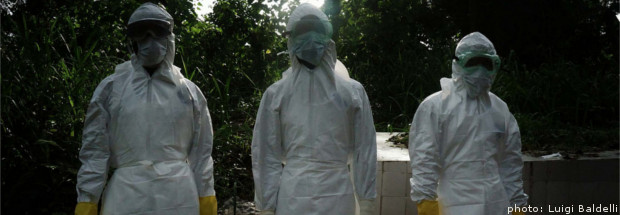The Ebola outbreak has evoked widespread fear and serious ethical concerns for nurses, and all health care workers. Given the uncertainty surrounding Ebola’s treatment and transmission, nurses are understandably concerned about how to weigh their personal risks with their professional responsibilities to care for all people in need of health services.
Embedded in these decisions are vexing ethical questions. How do we weigh the risks to health care workers, who are in direct contact with blood and body fluids of people with suspected or confirmed Ebola? There are very real concerns that some clinicians may refuse to participate in caring for people with Ebola. What are the consequences if a staff member refuses, arguing that the risk outweighs their professional responsibility? Will certain classes of health care workers—such as pregnant staff or those who are immunocompromised—be exempt? How can we reassure front line clinicians that the personal protection devices we have are adequate to protect their health? Is it justified to perform CPR on patients known to be carrying the Ebola virus? These are some of the ethical challenges that we must engage in to create a trustworthy system for both patients and clinicians.
Without compromise to patients, clinician safety must be a priority. Nurses have an ethical mandate to care for all people regardless of their diagnosis or other unique characteristics. Given the virulence of the virus and the severe contagion, we must give priority to supplying nurses with the knowledge, skills, and protective devices that reassure them of their own safety and those they care for. The American Nurses Association (ANA) has called for adopting more stringent standards for infection control.
Official information must be honest and transparent—illuminating what we do and do not know about the effectiveness of our medical interventions and infection control protocols.
It must be safe for nurses and others to speak up and speak out about their concerns in a manner that is respectful, taken seriously and without fear of retaliation. Nurses have an obligation to identify unsafe working conditions that include insufficient training and equipment.
Trustworthy communication among clinicians and organizations that acknowledges shared responsibility and creates realistic expectations and accountability will be necessary to address nurses’ fears and concerns, and will allow them to fulfill their ethical obligations.
Nurses and other health care workers need to be reassured that their current and future health will be protected by clarifying whether they will have access to investigational drugs, protective devices, and compensation if they become infected during the performance of their work duties. These issues are particularly intense for front line nurses who are most intimately involved in the care of people who are infected with Ebola.
In this Ebola crisis, nurses and other health care professionals must stand together to examine how we can collectively strengthen a culture that genuinely supports doing the right thing, at the right time, for the right reason. Nurses have always risen to the challenges in front of them—and they will continue to do so. Their commitment to put their patients first must be met with ethically sound policies that support them to fulfill this promise.
This blog originally appeared on the Johns Hopkins Berman Institute Bioethics Bulletin at bioethicsbulletin.org.




